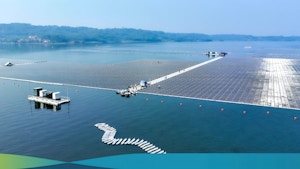Southeast Asia's Clean Energy Transition
All our latest stories. Back to Sea's Clean Energy Transition.

SDG 13. Climate
Cross-border clean energy projects are hard – but the returns are worth the pain: Sunseap co-founder Frank Phuan
As Southeast Asia eyes regional power trading to accelerate decarbonisation, veteran solar entrepreneur Frank Phuan unpacks the political, economic and logistical hurdles of moving clean energy across borders.

China's withdrawal of export rebates for solar PV and battery products, alongside rising raw material costs, have pushed prices up in the region. But the impact could be mitigated by the capacity of Southeast Asia’s solar manufacturers, which were affected by US tariffs last year.

SDG 9. Infrastructure
High costs, higher risks: Can the Philippines power its data centre hub ambitions?
The Philippines’ ambition to become a data centre hub is running up against high electricity prices and a coal-heavy grid.

SDG 9. Infrastructure
Floating solar has large-scale renewable potential in Malaysia, but challenges remain
Though not the most widely deployed solution, floating solar farms bypass land and social constraints, making efficient use of available space to potentially help achieve Malaysia’s renewable energy target – one that would otherwise be difficult or too costly to reach.

SDG 9. Infrastructure
TotalEnergies to power Google’s Malaysia data centres with 1TWh of solar energy
Google will also buy renewable energy for its Malaysian data centres from another solar project in the northern Kedah state from Japan-based firm Shizen Energy.

Floating solar deals, cross-border energy plans and a new carbon credit framework highlight early progress, but achieving net zero will require rapid capacity expansion and a more resilient, modernised grid.

SDG 13. Climate
Indonesia’s energy transition could be turbocharged by Chinese green finance, study finds
Redirecting the energy funding Indonesia receives from China entirely into renewables could mobilise up to US$9 billion over the next decade. But enabling Chinese investment will require stronger industrial policies, a study finds.

SDG 13. Climate
Asean must connect energy planning with environmental protection: Philippines energy director
As the Philippines gears up to chair Asean next year, Michael Sinocruz says the government will push offshore wind to bolster cross-border renewable energy trade, while protecting marine life impacted by infrastructure.

The city-state will generate no more than 10 per cent of its energy from solar by 2050, and is exploring geothermal, biomethane and regional energy-sharing to decarbonise, Singapore's energy minister said. The country is also planning a "low-carbon" data centre park – its first since a moratorium on data centres ended in 2022.

SDG 13. Climate
Southeast Asian banks need to end loopholes allowing finance for industrial coal power
If they are serious about a sustainable future, they must close loopholes and extend coal policies across clients’ entire value chains, denying new financing to companies using coal unless they have credible, time-bound clean energy plans.

Financing of up to US$ 10.7 billion is needed to modernise the regions’ power systems. Outage costs weigh mostly on the Philippines, Indonesia and Myanmar. However, Singapore, where power interruptions are rare, even has higher lost value, found a new report by Ember.

Southeast Asian energy ministers will meet in October to discuss the future of the region’s power grid. GEAPP’s Kitty Bu tells the Eco-Business podcast what areas they must collaborate on, and how finance and industry can help.


Transforming Innovation for Sustainability Join the Ecosystem →


